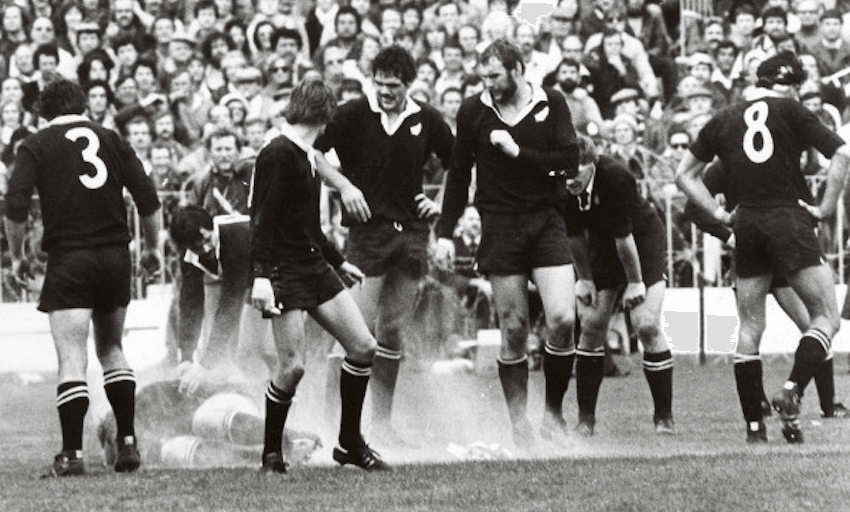On Thursday, the exhibition Mandela: My Life was officially opened at Eden Park, where in 1981 the All Blacks test against the Springboks was disrupted by flour bombs and flares. By then, Robert Burgess’s All Blacks career was long over, having been cut short by his refusal to play against apartheid teams. This is his speech from the exhibition opening.
Mandela’s extraordinary life shows us that a small group of thoughtful committed citizens can change the world.
South Africa and New Zealand have been long entwined through rugby.
In 1949, the year I was born, the All Blacks toured South Africa.
In 1956, the Springboks visited our Primary School in New Plymouth. We sang to them “Take me back to the old Transvaal”. I saw them play against Taranaki and in the test in Wellington. It didn’t register with me that they were all white.
In 1960, I was at intermediate school, when, in Sharpeville, 69 unarmed protesters were killed by South African police.Two months later, the All Blacks toured. No Māori were selected. I was aware of the call No Maoris, No Tour.
In 1965, the Springboks toured here, again. Only white players. Our 1st XV sent newspaper cuttings to their families in South Africa.
Of course, I argued with my cousin, sport, life and politics do mix.
In 1970, Mandela had been in prison for eight years. There was invitation from South Africa for an All Black tour; with Maori and Pacifika players… as honorary whites.
That year I was teaching in Invercargill. I’d played rep. rugby for Manawatu, the Junior All Blacks and NZ Universities.
Jack Borland from the Southland Rugby Union came to my door. They were nominating me, he said, for the All Black trials. I said, No, thanks. Jack was rather taken aback. I said I’d like to make it known that I was not available because of apartheid.
I was overwhelmed by telegrams and letters. A telegram from ‘Four Rugby Enthusiasts’ said, “To offset the likely abuse, please accept three hearty cheers, for one man with morality and guts. And hopes for dozens more like you”…
A white South African assured me that “many of them find apartheid very harsh. But there is very little that can be done.” Then he said, “Isolationists, trying to run our country, will have not the slightest effect.”
In 1971 and 1972, I was selected to play for the All Blacks, but, in 1973, a Springbok tour of New Zealand was scheduled. Fellow All Black Sandy McNicol and I were interviewed on TV about our opposition to it.
Again there was overwhelming support; like the 300 signatures of Westfield Freezing Workers, “Your opposition to racism will be supported by the majority of New Zealand people.”
Another message shouted: “YOU LONG-HAIRED CREEP / KEEP POLITICS OUT OF SPORT”.
In June 1976, the Soweto uprising led by black school children. One hundred and seventy-six deaths. The All Blacks started their South African tour later that same month. Twenty-five African nations boycotted the 1976 Olympics.
Throughout the 1970s, I played or coached rugby. I also actively supported our anti-apartheid organisation, HART. The day the Springboks arrived in New Zealand in 1981, I pulled out of rugby.
Nelson Mandela had been in prison 18 years and would stay there another nine.
In 1994, I watched my first rugby match in 13 years. It was the Springboks in New Zealand representing the new South Africa.
President Mandela insisted on keeping the name Springboks – an act of national reconciliation.
The closest I got to Mandela was in 1994, when I met his son-in-law. He was in New Zealand on an official research visit. When he learnt the part I’d played in the anti-tour movement, he stood, raised his glass to me and thanked me.
In 1995, on TV, we all saw Mandela on Ellis Park for the Rugby World Cup final, wearing a Springbok jersey. We saw then, the “democratic and free society in which all persons live together in harmony and with equal opportunities” that he’d envisaged 30 years earlier in his words from the dock in 1964, while facing the death penalty.
And in 2011, Arnold Stofile from the ANC presented me a Centennial Award and I was invited to the centennial celebrations in South Africa.
The best reward was seeing what Nelson Mandela had envisaged coming about, his commitment to an ideal, his exceptional generosity to others and that he survived to lead his country; the most extraordinary thing in my lifetime.





